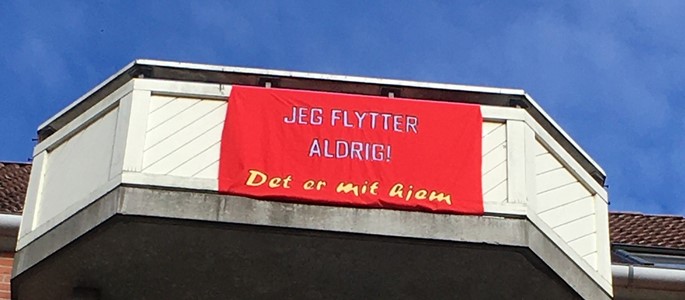UN to Denmark: Stop sale of “ghetto” buildings!
Ethnic criteria could amount to illegal discrimination, so the state must await court ruling, says human rights rapporteurs
Human rights violation?
A group of residents in one of the housing projects labelled as a “hard ghetto” by the Danish government, Mjølnerparken, are suing that same government for ethnic discrimination. They claim that it's illegal when the state wants to expel them from their rented apartments which are going to be sold to private investors. In other areas, thousands of well-functioning houses are going to be demolished next year, to leave room for new, private houses. This is part of the Danish “ghetto plan”.
Now the UN special rapporteurs on human rights are warning Denmark to await the outcome of the court case. “While the legality of the 'Ghetto Package' is being litigated in the Danish high court, the sale of Mjølnerparken must not move forward,” they said. “It does not matter whether they own or rent, all residents should have a degree of security of tenure, which guarantees legal protection against forced eviction, harassment and other threats.” Read the whole letter here.
Last year the United Nations High Commissioner for Human Rights said in a tweet that the package was “hugely troubling & risks heightening racial discrimination against people of migrant origin - further ‘ghettoising’ them. Coercive assimilation measures run risk of fuelling racial prejudice, xenophobia & intolerance.” See the tweet here.
The 'ghetto plan'
In 2018 the Danish parliament agreed on a new plan to change the balance of residents in certain areas with a socially low profile. This plan is very controversial in a social democratic wellfare state as Denmark: turning away from the wellknown tools of social support projects in collaboration with the residents, and instead using forced removals, economical sanctions and special laws designed for these areas only. This has been criticized heavily by many experts.
Many residents in the areas concerned have refugee background, first or second generation, though some have obtained Danish citizenship.
The criteria used to define a “ghetto” and a “hard ghetto” is the root of the criticism. Besides income and education level, unemployment and crime rates, one of the criteria is the number of residents with “non-western origin”. A statistical definition wich is quite unique for Denmark, also including people who are born in Denmark with one foreign parent and people born abroad who have obtained Danish citizenship. Foreigners from Europe, USA and a number of other countries do not fall in this category. The effect is that “non-Western” disproportionately means Denmark’s non-white, non-European ethnic populations.
The plan includes:
• Demolition and redevelopment of buildings. Forced removals of a certain part of the residents, mainly families, to make room for private investors and attract people with a stronger social profile. Current tenants will be offered alternative accommodation, but no control over its location, quality or cost.
• Obligatory daycare for children from the age of 1. If the parents fail to enroll the child, they will lose the child care benefit. Daycare is voluntary in all other parts of the country.
• Language tests for non-western children in kindergarten which must be passed before accessing school. Not used outside of these areas.
• Double up on criminal sentences for crimes commited in certain areas within the ghetto boundaries.
Read, listen, sign:
A group of residents have formed an organisation called “Almen Modstand”, campaigning to revoke the plan. One of the tools is a Borgerforslag (petition to the Danish parliament) which can be signed until December 13.
The plan and the law suit have been desribed in detail in several media in Denmark and abroad. Recently a critical podcast in Danish in 6 parts has become very popular, available on many platforms: “Mere end mursten” (October 2020).
Politiken: Mjølnerparkens beboere stævner staten for diskrimination (maj 2020)
NPR.org: Facing Eviction, Residents Of Denmark's 'Ghettos' Are Suing The Government (august 2020)
The Guardian: How Denmark's 'ghetto list' is ripping apart migrant communities (marts 2020)
Time.com: What to Know About Denmark's Controversial Plan to Eradicate Immigrant "Ghettos" (juli 2018)


